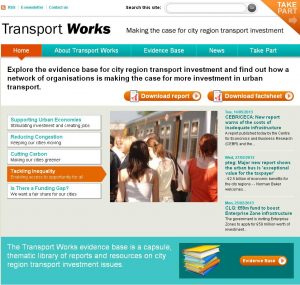The last spending review gave local transport spending outside London a good hiding. It lacked the political clout and built-in funding commitments that applied to London and national rail – the evidence base for the benefits of local transport spending also had too many gaps. Worse for the big regional conurbations was that by accident or design a significant shift has also taken place within local transport spending as decision after decision on funding formulas redistributed funding from congested urban areas in the regions (where it would do most good) to quieter rural areas – or the wider London commuter belt. Will June’s spending review be more of the same? Well if it is it won’t be because of the evidence base – which we have systematically upgraded since the last spending review, and encapsulated it on the www.transportworks.org website.
We’ve encapsulated the case for investing in transport on the Transport Works website at www.transportworks.org[/caption] From our report from Jacobs on the benefits of small public transport schemes to our recent ‘Case for the Urban Bus report’ we have made it our business to build a defence of local transport spending that George Graham would have been proud of. If there’s some big gaps in the evidence base for local transport spending then neither HMT nor DfT has told us what these are.
Resource spending: a three-way dogfight
Which brings us back to politics. On resource spending there’s a three-way dogfight. The cash avalanche from Whitehall into London’s transport system started when London showed it was willing to put its hand in its own pocket with the congestion charge. Since then The UK’s resident world city has been adroit in ensuring the national public funding that has headed TfL’s way has been well spent in renewing the fundamentals whilst making some transformatory and decisive shifts in the whole direction of transport policy – not least of which is on cycling. But the public spending squeeze has led to a change in approach from London with a stress on the potential for the capital to raise more of its own funding from its pumped up, city state tax base. This is also to demonstrate to Whitehall that London ‘gets it’ that when public spending is being squeezed London needs to get its own round in at the public spending saloon bar. Meanwhile national rail’s resource spend could only be reduced through unpalatable ideological choices on the current structure of the industry or unpalatable political choices (booking office closures, service cuts or strike-provoking moves on staff numbers, pay or conditions). All of which puts BSOG (Bus Service Operators Grant) for the rest of the country in the firing line. In the past support for bus services would have been a soft touch but the case for public spending on bus subsidies is robust and new alliances are being forged in its support – as our recent Westminster ‘Case for the Urban Bus” event showed.

New alliances are being forged in support of bus, as our recent ‘Case for the Urban Bus’ event showed. Pictured (L-R): Konstanze Scharring, Director of Policy, SMMT; Stephen Joseph, Chief Executive, Campaign for Better Transport; David Brown, Chair, pteg; Pedro Abrantes, Economist, pteg; Claire Haigh, Chief Executive, Greener Journeys; Dr Janet Atherton, President, Association of Directors of Public Health; and Tony Travers, Director, LSE. Picture by Andrew Wiard andrew@reportphotos.com
Capital spending: small is beautiful
Meanwhile on capital funding there’s a more secure consensus around the importance of capital spending on transport to support growth. The question is what kind of capital spend? There’s something primal in politicians’ brains that triggers an urge for road building whenever there’s a recession. Perhaps it’s the trace memories of the 1930s and the heroic images of the New Deal where you could go down to the labour exchange and give men picks and shovels and send them off to build an Interstate. Whatever it is, this urge can be clearly seen in the transport spending figures where after an initial big cut in national roads spending in 2010 there was a change of mind in the 2011 Autumn Statement when spending on national roads suddenly shot up again. But as alluring as big new roads are to national politicians, the economy’s faltering progress and with planning horizons shrinking towards the next election – the case for local transport spending outside London could benefit. This is because small can be beautiful when you want schemes that can be up and running quickly. Road maintenance, bus priority, station improvements, cycle schemes – they can all create and sustain jobs right now to make them happen, and they can deliver rapid benefits in reduced congestion and better access to employment. Plus many of these schemes formed part of rejected competition bids which were ready to roll and can therefore be easily reanimated if funding becomes available.
The big questions
So the big questions that the spending review will answer or fudge: Will the primal political appeal of new roads lead to a further splurge in national roads spend at the expense of local transport? Will national rail remain the great untouchable of transport spending? Will the Treasury wake up to the fact that whilst government talks up spending on cities the memo isn’t getting through when it comes to decisions on funding distribution formula which are actually taking cash out of congested urban areas. Will having a now largely uncontested evidence base for local transport spending outside London result in the better funding deal it deserves? Will London pull it off again? And of course there’s a longer game beyond this spending review. Whatever happens this time round, the evidence base and the credibility of public spending on buses and wider urban local transport spend is now in a much better place. Plus London’s moves towards greater financial independence could also benefit Britain’s other urban areas. It’s been two steps forward, one step backwards and one step sideways on devolution of funding and decision making for the regional cities so far – but Boris Johnson can go toe to toe with HMT on funding freedoms in a way that the regional cities just can’t. Everything to play for!
Jonathan Bray
